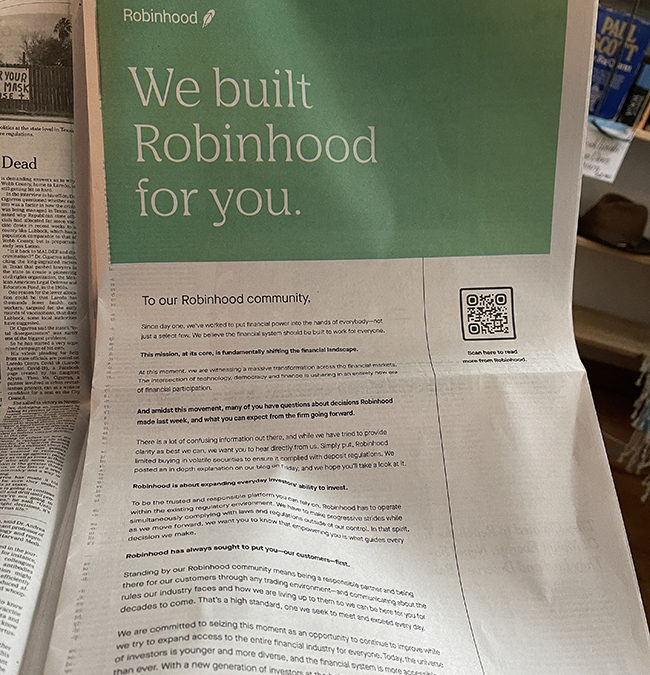I cringed, opening the New York Times on Tuesday morning, to read a full-page ad saying “We built Robinhood for you.” Then my wife said “erm.” We agreed: There was an off-note about the ad. It felt like the product of a crisis communications meeting.
Suffice to say the founders built Robinhood to make themselves rich. And their investors. That’s who they built the app for. They should never have named themselves after a medieval robber. The amazing thing about tech firms is they can go from an idea to be worth billions in a few years. From an investment perspective, it makes sense. But even the worst-run startup can beat competitors if investors prop it up.
Imagine the crisis meeting: “We’re worth $10 billion. But our value comes from a fickle user base of millennials. We’ve told them using our app helps them buck the financial system. But if they actually coordinate to do that, we’re at risk. We’ll run out of money to pay out on their risky trades, and draw heat. From Washington, from our competition, and from the users themselves.”
Whatever the short term ad-buying madness, as far as I can tell, Robinhood’s future is in serious trouble. The full-page Times ad will have cost at least $150k. And for that money, one could have done an awful lot of proactive media relations work. But it’s unlikely to help. The problem was in the company’s founding. Their mission to make investing accessible to everyone wasn’t authentic. It was a disruption play on investment brokerages charging $10 a trade. That’s all.
The real problem to solve is: Inequality. Some people in America need to get rich quick. Doing so the old-fashioned way is off the table for many of us. Add to that the fact that there is not enough decent financial education done in this country. Deficits in financial literacy cost Americans $415 billion last year. And that’s a message I would pay thousands of dollars to see splashed in the New York Times.
Apps like Goalsetter are aiming to teach financial literacy to young people. It raised $3.9 million from investors, last week, and I’m glad to see it. There’s also a bill in the legislature in Nebraska to teach financial literacy in the state’s high schools. I like the sound of it.
There’s huge money in doing strategic communications work for tech firms. The problem is that if I were honest with Robinhood, they would be unlikely to engage me to work for them…
“Apologize, get ready to lose the majority of your user base, and work with Washington. Meanwhile, share what you’ve learned in the process. And pour your energy into financial literacy for all Americans.”
From an investor perspective it’s actually good, risk-limiting advice. And it makes a lot more sense than splashing out for adverts in the paper of record. But the founders of the company would need to be honest with themselves about their position. And that’s a hard sell for anyone.
It means beginning a crisis meeting with the words: “You’re f___ed. And that’s all there is to it. Now, let’s talk about your long-term future.”
These are bitter pills to swallow in America.


